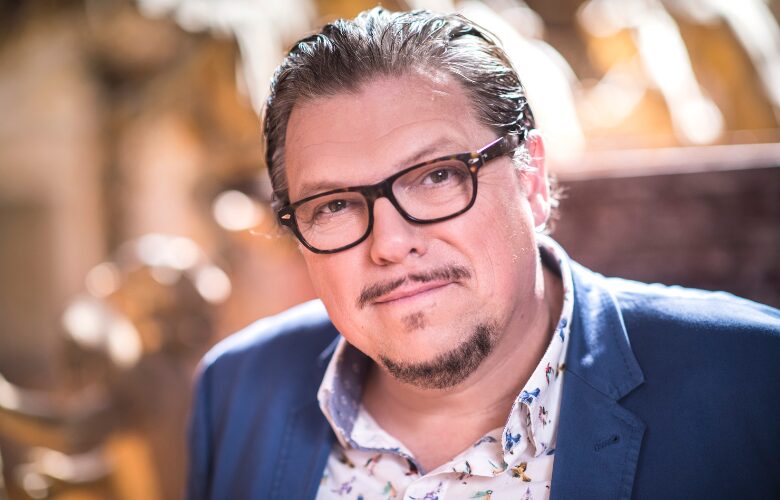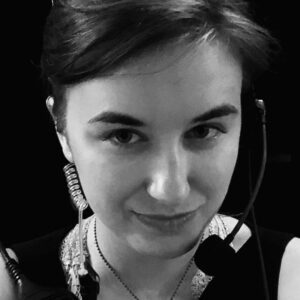
In this interview with Michael Schade, we get an exclusive insight to his life before he became a celebrated opera singer and why he dedicates so much of his work and passion to helping those in need. Michael Schade is a Canadian opera singer who was raised in Germany and Canada. He appears regularly on several well known opera stages across the world, and in 2017 he was granted the tittle Officer to the Order of Canada (O.C.).
Photo above pictures Michael Schade. Photo credit to Daniela Matejschek.
Dear Lord, to see, you’ve been googling me. Yes, The Odd Socks were a fun little a cappella group that we had in high school, it even went on to become the London Lads at one point when I studied in London, Ontario. I think the highlight was that we got on ABC News one year during spring break…in 1986 or something crazy like that and then life became a little more serious.
I suppose that the real reason it helped my opera career is because eventually, I figured out that I hated going doo whop, whop and singing only about one subject, namely the love expressed by oh baby baby. In other words, it dawned on me very early that expression and poetry and the depth of music is what I sought and what I still seek every day.
Becoming an Officer to the Order of Canada was literally receiving a knighthood, it is the equivalent of becoming a Sir in England, but Canada has its own honours, and therefore we cannot become Sir and Dames, but Officers to the Order of Canada. It was one of the greatest thrills of my life.
If you mean, dedicate, in terms of dedicating myself to the truth of art, and making sure that every word counts, then I do dedicate myself daily to this beautiful art form. In terms of dedicating performances to friends or deceased ones, it is because often you feel like you can communicate with those who have passed and who have helped you get there singing straight to them on stage.
Photo above of Michael Schade in Idomeneo. Photo credit to Keith Saunders.
I had two women teachers, namely, Roma Butler Riddell, in my undergraduate in London, Ontario, where I came straight out of medical sciences. And then, during my days at the Curtis Institute, and certainly throughout my earlier career, I studied with Marlena Malas while I was doing my Masters at the Curtis Institute and beyond that. Marlena Malas is and was one of the most influential teachers of the last century, and what I loved most about her was the fact that she absolutely demanded the natural sound and that nothing was created, nothing is ever pushed, and one must except one’s voice to float as beautifully and sing as beautifully as possible.
I have raised money for the research of leukaemia, and unfortunately my mother and brother both died of cancer. So I am happy to help causes like that and I’m very passionate about making sure that if one raises money it has to be for a specific instrument needed for cancer research and that the money raised is not just another drop of water on a warm stone.
I flew back-and-forth between Canada and Europe about 10 times a year between 1991 and 2020. It was just during Covid that we decided as a family that Vienna would become our main hub. We still travel a LOT. Covid give me a two year chance to experience the subsequent joys of winter, spring, summer, fall and back to winter in one single place. I worked very hard at creating music and as soon as there was a chance to have any more than five people in the room, we ended up making house music and house concerts. Salon concerts created wonderful venues for young artists to survive, and I, too, had a real entrepreneurial sort of spirit during that time. But the important thing is that as a singer when you’re flying around globally often, you don’t experience the seasons because you’re going from place to place where nature is different. So it was a real eye-opening wonderful thing and I do very much love living in Vienna, although one has to say it is lovely to experience summer in January-February as one does in Sydney.
Opera really is a global game now. When I started, there was very much an ensemble feeling at the state opera and great traditions that one got to know and it was a wonderful time. Many of the houses in Germany had that as well: Dresden, Munich, Hamburg. Perhaps sadly some of that is gone a little bit, but it is certainly a wonderful pleasure to work globally. I think that audiences in North America and in Canada and Australia and Italy are much more conservative than the audiences of Germany and Austria. Sometimes I don’t know if it is a choice that they have but it is the stuff that’s given to them.
Photo above of Michael Schade in Idomeneo. Photo credit to Keith Saunders.
Mozart was a genius, the kind of genius that happens very rarely in history. All music inspires to become classical because classical means nothing but that which stands the test of time. In other words, things that we aspire to, and learn from for generations and generations, after it was created. That is the same with great visual art and that is the same with things to do with history. So some things, some paintings, some pieces of music are so valuable that they literally become priceless. We can no longer buy them for money. If you think about some of the great Monet, or Clint or other paintings, you cannot buy them for money. Mozart is an unending deep well and this piece in particular, Idomeneo, is one of the greatest works that he created, and therefore a lesson to be continuously learned from, besides the fact that it is just an awfully beautiful and entertaining opera.
Nikolaus Hanoncourt was my father Music. He was probably the nicest man and the most intelligent man and the most deep feeling musician I’ve ever met in my life. That is not to say that he was just a gentle man, no, he was someone who demanded things, and who always fought hard for his ideas, constantly correcting ideas, and doing deep deep research about what it is that he was after. He was greatly and ultimately historically informed, and is very much a godfather of the ancient music revival and of the work with original instruments – something that to this day is one of the most important things in my life. The thing about him though was that despite all of that, wanting us to work as hard as we can, and despite his fighting forward, he believed, and he never ever was short or disrespectful, or in any way other than that he was just a fantastic human being.
I would say to all young singers that it is most important to diversify as a singer. In other words, don’t just be an opera singer, please be more than that. Please be a recitalist singer who can also sing oratorio. Dig deep, dig hard to make yourself have a path that includes oratorio and also recital work. Often that means creating it on your own grassroots stuff that grows and grows if you’re lucky. Film television is also very important work. I suppose the two words are diversity and friendliness because you never know who’s going to be on some board and remembers that you weren’t friendly at some point in time, when you need their approval – also life is too short not to be friendly. I also think that it’s very important to not just be a taker in the business of music, that you have to help create. I love my job as Artistic Director of a major book festival in the world. I love managing music and I love teaching young singers. Therefore it is not just to take a situation, one has to give.
Photo above of Michael Schade in Idomeneo. Photo credit to Keith Saunders.


Janine has always been a part of music and performing. The first show that inspired her to go into theatre was the Velveteen Rabbit which she saw as a child, and Drew works to keep that magic alive in her work. When Drew was accepted into an internship program for audio engineering at a recording studio, she jumped at the opportunity. That was at the start of 2020, and so much has happened since then, both in her career and in the world. Since then, Drew has taken several opportunities to work at recording studios, concerts, festivals, and even large theatres while spending some time on tour. Drew's favorite by far though, has been the chance to work on Broadways and West End shows, as this was a dream come true. Drew is honoured to get to share these experiences from being inside the entertainment industry.
Read Full Profile© 2021 TheatreArtLife. All rights reserved.

Thank you so much for reading, but you have now reached your free article limit for this month.
Our contributors are currently writing more articles for you to enjoy.
To keep reading, all you have to do is become a subscriber and then you can read unlimited articles anytime.
Your investment will help us continue to ignite connections across the globe in live entertainment and build this community for industry professionals.